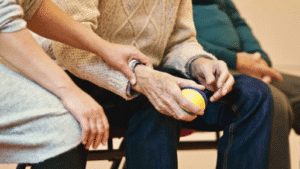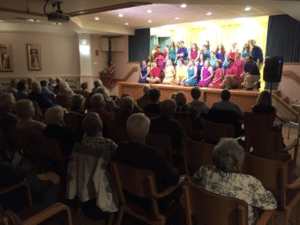Even before I was a teenager I realized how music could have a lasting impact on a person. Think about keeping a list of 26 items and memorizing them in order. Seems like a monumental task? Now sing your A, B, C’s. Music has a special way of leaving a lasting imprint.

The first time I realized that music could change lives, I was only 12 or 13 years of age. I was volunteering at a local nursing home and decided to start a resident choir. Around 16 residents participated and each was in differing stages of health. A few residents who sang were in late stages of Alzheimer’s or dementia and often didn’t recognize their families. The adult children of these seniors were shocked to come to our little concert and see their parents singing along. These residents couldn’t remember their family, but they could sing every lyric to that old song they had been singing as a child.
Music is magic. Not only does music improve memory, but it can have a positive impact on a person’s mental and physical health. Studies are ongoing to prove the health benefits of music, but most studies suggest that listening to music can have the following positive effects on health.
· Music can improve your mood.
· Music can limit anxiety.
· Music can reduce stress.
· Music can improve the exercise experience.
· Music can improve memory.
These are just a few of the health benefits of music. Studies are being conducted on music’s ability to ease pain, improve cognition, and provide benefits to people on the autism spectrum.

For generations, school and community choirs are brought into nursing homes, senior centers, and 50+ communities, not only to entertain residents but to improve their health and outlook on life.
We want to hear your stories on how music has had an impact on your health or the health of someone in your family. Has your choir performed for seniors in your community? Send your stories and images to shayne@harmomyhelper.com.
REFERENCES
· 1. Harvard Health Publications. Harvard Medical School. Music & Health. July 2011. 1-6.
· 2. Chanda ML, Levitin DJ. The neurochemistry of music. Trends Sci. 2013;17(4):179-193.
· 3. Hole J, Hirsch M, Ball E, Meads C. Music as an aid for postoperative recovery in adults: a systematic review and meta-analysis. Lancet. 2015;387:1659-1671.
